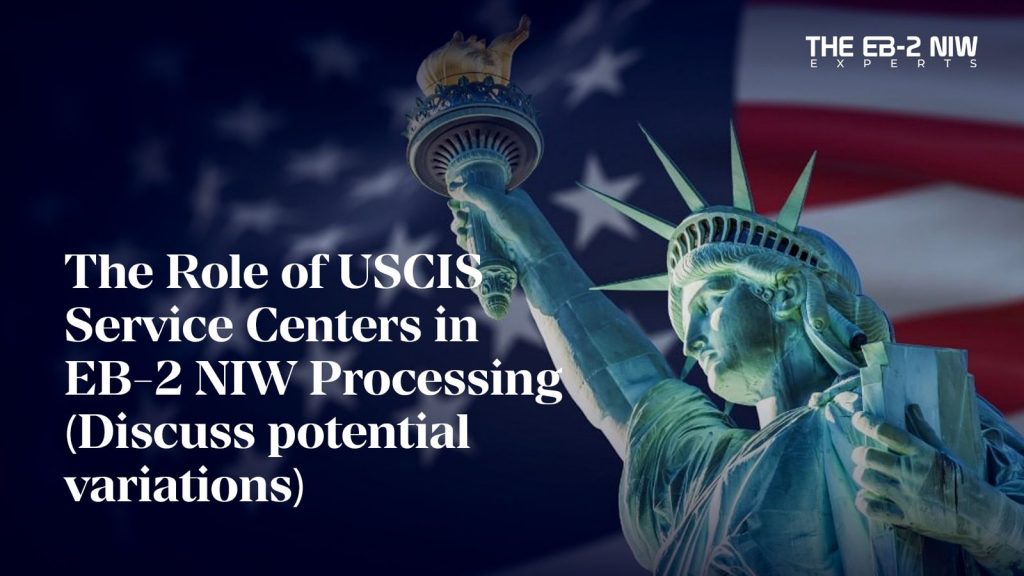Introduction:
When embarking on the EB-2 National Interest Waiver (NIW) journey, understanding the intricate process is key to a successful outcome. One crucial aspect of this process is the role played by USCIS Service Centers. In this comprehensive guide, we’ll delve into the significance of USCIS Service Centers in EB-2 NIW processing, exploring potential variations that applicants may encounter along the way.
The Role of USCIS Service Centers:
USCIS Service Centers serve as central hubs for processing various immigration applications, including EB-2 NIW petitions. These centers are responsible for receiving, reviewing, and adjudicating applications based on established criteria and regulations. Each Service Center may handle a specific geographic region or type of application, contributing to the efficiency and consistency of the immigration process.
Understanding Potential Variations:
While USCIS Service Centers follow standardized procedures for EB-2 NIW processing, variations may arise due to factors such as workload, staffing levels, and policy changes. These variations can impact the processing times, documentation requirements, and decision outcomes for applicants. It’s essential for EB-2 NIW petitioners to be aware of these potential variations and prepare accordingly to mitigate any challenges that may arise.
Variations in Processing Times:
One common variation experienced by EB-2 NIW applicants is differences in processing times between USCIS Service Centers. While some centers may have shorter processing times due to lower caseloads or efficient workflows, others may experience delays due to high volumes of applications or staffing issues. Monitoring USCIS processing time data and staying informed about center-specific trends can help applicants manage their expectations and plan accordingly.
Documentation Requirements:
Another aspect where variations may occur is in the documentation requirements set forth by different USCIS Service Centers. While the basic eligibility criteria for the EB-2 NIW category remain consistent, specific documentation requirements or evidentiary standards may vary between centers. Applicants should carefully review the guidelines provided by their designated Service Center and ensure that their petition packages meet all necessary requirements.
Decision Outcomes:
The ultimate decision on EB-2 NIW petitions rests with USCIS Service Centers, and variations may exist in the approval rates or adjudication standards applied by different centers. Factors such as regional priorities, policy interpretations, and adjudicative discretion may influence decision outcomes. Applicants should be prepared for the possibility of variations in approval rates or the need to provide additional evidence or explanations to support their cases.
Navigating Potential Variations:
To navigate potential variations in EB-2 NIW processing, applicants should take proactive measures to enhance their petitions’ strength and resilience. This includes thorough documentation, clear and compelling argumentation, and timely response to any requests for additional information or clarification from USCIS. Seeking guidance from experienced immigration attorneys or consultants can also provide valuable support and insight throughout the process.
Conclusion:
Understanding the role of USCIS Service Centers and potential variations in EB-2 NIW processing is essential for applicants seeking to secure approval for their petitions. By staying informed, proactive, and prepared, applicants can navigate the complexities of the immigration process with confidence and increase their chances of success in obtaining the coveted NIW designation.
FAQs
What are USCIS Service Centers, and what is their role in EB-2 NIW processing?
USCIS Service Centers are key administrative units responsible for processing various immigration applications, including EB-2 NIW petitions. They review and adjudicate applications based on established criteria and regulations.
How do variations in processing times impact EB-2 NIW applicants?
Variations in processing times between USCIS Service Centers can affect the overall timeline for EB-2 NIW petitions, potentially leading to delays in decision outcomes. Applicants should monitor processing time data and plan accordingly.
What steps can EB-2 NIW applicants take to navigate potential variations in processing?
To navigate potential variations, EB-2 NIW applicants should ensure thorough documentation, clear argumentation, and proactive engagement with USCIS. Seeking guidance from immigration professionals can also be beneficial.
Are there specific documentation requirements that vary between USCIS Service Centers?
While the basic eligibility criteria for the EB-2 NIW category remain consistent, specific documentation requirements or evidentiary standards may vary between Service Centers. Applicants should review center-specific guidelines carefully.
How can applicants improve their chances of success in EB-2 NIW processing despite potential variations?
Applicants can improve their chances of success by preparing comprehensive petition packages, addressing any potential weaknesses or concerns, and staying informed about center-specific trends and requirements.
Looking to navigate the complexities of EB-2 NIW processing with confidence? Contact us today for expert guidance and support.


